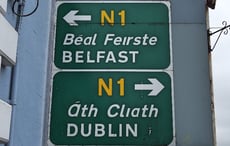An Irish man has been arrested in New York for allegedly breaking a British police officer's nose more than four decades ago during a street brawl in his youth and now faces an extradition hearing in mid-June.
Rory McGrath, 62, was arrested by federal authorities at his home in Pearl River on May 11 and appeared before a US federal judge on May 18.
According to the New York Post, he was released on a personal recognizance bond of $1 million and faces an extradition hearing with the UK authorities in mid-June.
The tabloid paper reports that UK authorities have "spent years" trying to secure his arrest and extradition in what is described as a highly unusual effort considering that the age of the allegation, which is relatively low-level.
McGrath faces five years in prison if charged with breaking a police officer's nose during a street brawl in Leeds on March 28, 1980.
The street fight reportedly kicked off when McGrath's friend Leslie Swithenbank punched another youth in a pub in the Garforth section of the city, prompting a local cop to attempt to break up the fight.
The officer allegedly sat on Swithenbank in the middle of the street in an attempt to detain him.
A group of Swithenbank's friends - including McGrath - hurled the officer to the ground before running away from the scene.
However, the officer gave chase and caught up with the group in a nearby parking lot.
According to prosecutors, he caught hold of McGrath, who allegedly "booted the cop" and punched him in the face.
The officer, who is still alive today, needed surgery to repair his broken nose.
McGrath and several of his friends were arrested shortly after the brawl broke out, but he reportedly chose to leave the UK rather than face a date in court. He made for New York, where he has lived ever since.
In 2018, UK authorities suddenly filed an extradition request with the US State Department, asking for him to be transferred to their custody.
McGrath told Magistrate Judge Paul Davison that he was shocked by his arrest, while the judge acknowledged that McGrath clearly did not view himself as a fugitive.
"On the one hand, Mr. McGrath has apparently been a fugitive from justice for most of his adult life. On the other hand, I am told that he attended a wedding in the United Kingdom during the intervening years, which suggests to me that he did not view himself as a fugitive," Davison told the hearing on May 14.
He agreed to release McGrath on bail after his lawyer highlighted his client's health issues, which are reportedly linked to volunteering at Ground Zero in the aftermath of 9/11.
The judge warned McGrath not to skip bail.
"You know, this has been hanging over your head all your life, and you need to get it behind you. But really, really bad things will happen to you and your family if you violate the terms of this bond," Davison told McGrath.
West Yorkshire Police and the UK Home Office would not comment on why they were seeking McGrath's extradition for an alleged offense that took place more than 40 years ago.
Heather Cucolo, a professor at New York Law School, told the Post that McGrath's arrest was "out of the ordinary".
Cucolo said that political factors may have been involved in the decision, stating that several EU countries had refused to extradite nationals to the UK in the aftermath of Brexit, which has prompted the UK authorities to turn to the US to "effectuate prosecutions".




Comments